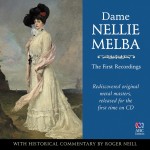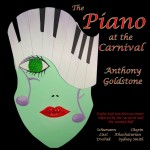Review: Alexander Lewis (tenor)/David Wickham (piano)
by Neville Cohn
The notion of a parent teaching a child music is neither new nor unusual. Famed pianist Clara Wieck (who married composer Robert Schumann) was coached to greatness by her famously domineering father Friedrich. Far and away the most celebrated of these arrangements is that of Leopold Mozart guiding the musical development of his phenomenal genius child Wolfgang Amadeus.
Much more recently still was the famously fractious relationship between pianist Ruth Slenczynska (who gave all-Beethoven recitals in Paris aged nine years) and her frighteningly strict father Joseph who would strike the tips of little Ruth’s fingers with a metal ruler at lessons if he found fault with her keyboard technique.
Nearer to home, and infinitely less fraught, are Patricia Price, noted vocal teacher, and her singer son Alexander Lewis who recently returned from a tour of Phantom of the Opera in which he sang in over 300 performances as Raoul across Australia and as far away as Taipei in Taiwan.
Warmly acknowledging the teaching skill of his mother – she has been her son’s only teacher – Alexander said “working with Mum means everything to me. I think Mum sometimes finds it hard to be really tough on me because I am her son but she knows how to get the best out of me”. He says that without his mother’s guidance, he wouldn’t be the singer he is today.
Perth-based Alexander’s work ethic was formed in childhood when the family was based in Harpenden, England where his father Michael Lewis sang in opera in both the UK and Europe. At the venerable age of seven and a half years, little Alexander became a chorister at St Alban’s Cathedral. There, he was expected to front up for practice three days a week before and after school with a rehearsal from 6 to 9pm on Fridays, Saturday afternoon rehearsals followed by Evensong with two and sometimes three services on Sundays.
Initially, Alexander trained as a baritone but when his mother flew to New York to hear her son sing Rossini’s Largo al factotum with the Adelaide Symphony Orchestra at Carnegie Hall, she realised Alexander’s voice was metamorphosing into that of a tenor. With change of voice comes change of repertoire, a daunting prospect bearing in mind how much of the tenor repertoire there is to learn – and how much of the baritone material had to be jettisoned. “I’m going to miss singing Largo al factotum and Billy Budd’s aria – but sadly they have to be left behind”.
Here, as in all things musical, Alexander turned for guidance to his mother who said that “of course, the relationship is very different to that with my other students because Alexander is my son.
“We are able to show our frustrations (that inevitably crop up during lessons) much more openly because of this and we don’t have to search for the right words when grappling for solutions to musical problems”, she said. “Al is always prepared to listen to me and trust my advice”.
Price adds that her son is invariably “hungry for improvement and is never complacent. His main purpose is to sing and always has been – and this makes my teaching much easier.
Alexander’s mother believes that the key to their successful master/student relationship is a mutual respect and a shared love of singing. “I think that I learn as much from Alexander as he does from me”.
In 2001, the then-18 year old Alexander became the youngest-ever finalist in the Australian Singing Competition. A semi-finalist in the Neue Stimmen (New Voices) Opera Competition in Germany in 2007 (as a baritone), Alexander will be back there for the finals in October – as a tenor – singing arias by Mozart, Gounod, Tchaikowsky and Verdi.
“There are various cash prizes for the finals”, he said. “But the really important thing is having exposure to the people on the adjudication panel and those, such as agents, who attend the contest. There is the potential for job offers”, said Alexander.
On Sunday 6 September at 4pm, Alexander Lewis with David Wickham at the piano will present a recital of American songs at Government House Ballroom. Some of it will be familiar to most local concertgoers but a deal of it will be refreshingly new in this neck of the woods, in particular Gene Scheer’s Voices from World War II as well as songs by Kurt Weill and Leonard Bernstein. Tickets at $35 ($25 concession) are available from WAAPA box office.
Monies raised by the recital will fund visits to WAAPA of leading singers and teachers to give master classes to students.
RECITAL
Alexander Lewis (tenor)/David Wickham (piano)
Government House Ballroom
reviewed by Neville Cohn
Alexander Lewis is that vocal rarity: a trained baritone whose vocal range has altered so significantly that he is now a tenor.
In a taxing program that effectively blurred the line that divides art songs and music theatre pieces, Alexander Lewis, who moves about the stage as if it were his natural milieu, gave abundant evidence of an ability to adapt, chameleon-like, to any of a range of styles.
Gene Scheer’s Voices of World War II was fertile fare for Lewis’ abundant gifts, in which consistently clear diction and an ability to home in unerringly on the mood appropriate for each song, combined to most pleasing effect. Whether singing of an invitation to tea in a house in wartime London, of a German U-boat captain or holy water in the hell that was Omaha Beach on D-Day, Lewis demonstrated a most convincing narrative gift. I particularly admired David Wickham’s skill at the piano in the turbulent, beautifully stated accompaniment to the song about the U-boat captain. In fact, Wickham’s prowess at the keyboard was like a golden thread through the recital, not least in a virtuosic, bright-toned introduction to the afternoon in Ricardo Lorenz’ Bachango.
In a recital glittering with fine moments, I very much admired the skill brought to bear on Ned Rorem’s arrangement of Stephen Foster’s Jeannie with the Light Brown Hair. Wickham’s delicate backing for Lewis’ immaculately stated line made this one of the gems of the afternoon.
Even the ubiquitous Maria from Bernstein’s West Side Story sounded fresh and newly minted with its extrovert and ardent vocal line and buoyant accompaniment.
Wickham’s magical treatment of two of Gershwin’s Preludes extended to his accompaniment of songs by William Bolcom, making light of villainously tricky writing in Over the Piano and evoking, beautifully, the poignant quality of Waitin’.
In a bracket of folk songs, Lewis was entirely convincing in I Gave My Love a Cherry and Black is the Colour of My True Love’s Hair.
<script type=”text/javascript”><!–
google_ad_client = “pub-7816164982777719”;
/* OZartsreview */
google_ad_slot = “9752430106”;
google_ad_width = 468;
google_ad_height = 60;
//–>
</script>
<script type=”text/javascript”
src=”http://pagead2.googlesyndication.com/pagead/show_ads.js”>
</script>




